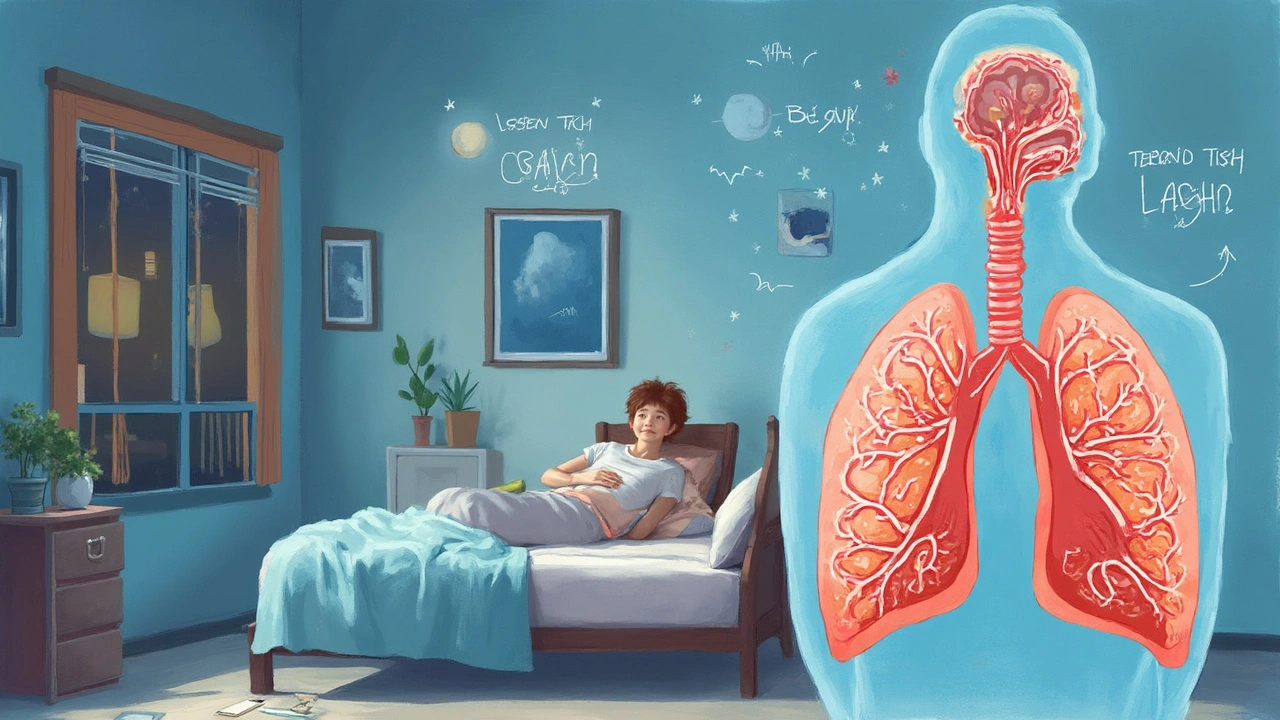Night Sweats and Asthma: Signs You Need a Medication Check or Lung-Function Test
 May, 22 2025
May, 22 2025
Picture this: It’s 3 a.m. and you’re wide awake, sheets damp, heart pounding, trying to suck in a breath that won’t quite come. Sweaty nights might sound like something you blame on spicy food, late-night snacks, or a summer heat wave, but for people with asthma, waking up drenched is more than just a nuisance. It can be a red flag—a signal your asthma isn’t as well managed as it should be.
Most people chalk up night sweats to hormones, stress, or even nightmares. But if you notice they’re happening along with worsening shortness of breath, cough, or chest tightness, it’s time to look closer. When my own asthma acts up, it tends to creep in at night, often catching me off guard when my body is supposed to be resting. Luna, my cat, isn’t much help—she just stares while I toss and turn.
Let’s get into the details about why your nights matter, why asthma can wake you like this, and what you’re supposed to do when the pillowcase is soaked and the inhaler is almost empty. We’re going to untangle all the info around night sweats asthma and why it actually deserves your attention.
Why Night Sweats Happen with Asthma
So, what connects asthma to waking up sweaty and miserable? It’s actually a chain reaction happening while you sleep. When airways become inflamed or constricted, your body stresses out. That stress can jolt the nervous system, raise your heart rate, and—yep—trigger those unwelcome night sweats. People with poorly controlled asthma are more likely to experience nighttime symptoms, from increased coughing and wheezing to actual attacks. It’s something doctors call 'nocturnal asthma,' and it comes with its own set of drama.
If you’re the sort who follows stats, here’s one that might surprise you: nearly half of people with asthma notice their symptoms get worse at night. According to the National Heart, Lung, and Blood Institute, nighttime asthma can lead to poor-quality sleep, more missed days at work or school, and way more doctor visits. If you find yourself using your reliever inhaler more than twice a week—or waking up gasping—night sweats can be a side effect of all that respiratory turmoil.
But don’t think it’s just the asthma alone. Sleep plays tricks: when you enter deep sleep, your body's natural cortisol (aka, anti-inflammatory hormone) dips. Airway inflammation can ramp up, making the lungs more twitchy and reactive. Meanwhile, your airway muscles relax, narrowing already sensitive passages. That’s the perfect setup for broken sleep, wheezing, and—you guessed it—a pillow soaked in sweat. A Danish study from 2022 showed frequent night sweats were linked to worse asthma control, and participants reported higher daytime fatigue and anxiety at the same time.
Worse, chronic night sweats aren’t just a comfort issue. They point to extra work for your heart and lungs. When you’re sweating buckets, your body is laboring harder, not getting the rest it desperately needs to fight inflammation. And since poor sleep is tied to higher asthma severity, it sets off a cycle: more symptoms, worse sleep, even more symptoms the next day. People don’t always realize these are connected.
Of course, not every sweaty night means asthma is to blame. It’s worth thinking through other possible triggers, like infections, menopause, or certain meds. But if your sweats are brand new, getting more intense, or matched with breathing trouble, it’s time to start thinking about asthma management—not just buying new bedsheets.

When Night Sweats Point to Poorly Controlled Asthma
Night sweats are annoying, but they’re especially worrying for people with asthma. What counts as a real asthma warning sign versus a random occurrence? Spotting the difference can save you months (or years) of bad sleep and out-of-control symptoms.
Here’s how to tell if your night sweats are related to asthma:
- You’re using your quick-relief inhaler more at night
- Coughing, wheezing, or chest tightness wakes you up
- Breathlessness doesn’t resolve with usual medications
- You feel more tired during the day even after a "full" night’s sleep
- Symptoms flare up after triggers like dust, pets, or cold air
- Your peak expiratory flow rate (if you use a peak flow meter) keeps getting lower in the mornings
If you nodded along to any of those, don’t shrug it off. The official guidelines from the Global Initiative for Asthma (GINA) suggest that any sign of asthma getting worse at night merits a review of your treatment strategy. Why? Poorly controlled asthma ups your risk for severe attacks, ER visits, and even hospitalizations.
And it’s not always about medication alone. Sometimes, the issue is hidden: maybe your inhaler technique isn’t quite right, or allergens in your bedroom are ramping up inflammation while you sleep. When your sheets are a mess and your lungs feel tight, it’s your body’s way of telling you something’s off.
Let’s talk about consequences. Scientists have seen that people with repeated nighttime symptoms are more prone to cardiac problems over time (because the heart works overtime during stress), and they’re likelier to experience issues with memory, focus, and mood. That matches what I’ve felt—after a rough, sweaty night, I wake up feeling like I’m thinking through fog, and even Luna seems less than impressed. If you also notice a pattern, don’t wait for things to magically improve.
I stumbled across this excellent breakdown of how night sweats tie in with asthma and what signals are especially worrying—if you’re looking for more details, check out this thorough guide on night sweating asthma warning. It does a great job showing where that tipping point really is.
Real talk: asthma isn’t just about one or two “bad days.” When your symptoms spill over into your sleep—and your dreams—the risks go up. It’s so easy to get used to restless, interrupted nights and start thinking, “That’s just how it is for me.” But research shows better control is totally possible, and it starts with knowing what’s worth chasing down.
If your asthma has ever sent you to the ER or you’ve used steroid tablets in the past year, the guidelines say you’re especially high risk and need a check-in. This is when you want to get serious about next steps, and not wait for ‘next time’ or hope the next night will be easier.

How to Know When to Ask for a Medication Review or Lung-Function Test
Okay, you’ve got night sweats, and you’re suspicious they link up with your asthma. Here’s when to stop hesitating and pick up the phone:
- You notice new or worse night sweats over days or weeks
- Asthma symptoms keep you up more than once a week
- The quick-relief inhaler (like albuterol) feels less effective
- Your partner or family hears you coughing or gasping at night
- You wake up with tightness, chest pain, or shortness of breath repeatedly
- Daily activities are affected by poor sleep or fatigue
- You’ve had to visit urgent care, the ER, or started steroids more than once in a year
- You use a peak flow meter and readings drop, especially mornings
Your doctor might suggest a medication review. What does that mean, really? It’s more than just a quick “how are you?” It should include a deep look at which meds you’re using, how often, and how well you’re actually taking them. Inhaler technique gets checked (because apparently, more than 50% of adults do it wrong—yikes). Sometimes doctors suggest adding or switching controllers, or maybe adding an anti-inflammatory inhaler or even oral meds if you need them.
Beyond talk, a lung-function test—like spirometry or peak flow test—is a simple, painless way to get real numbers on how well your lungs are working. They compare your breathing to what’s expected for your age, height, and weight. After inhaling or exhaling into what looks like a space-age straw, the machine gives a score that shows where you stand. Asthma that’s truly well managed should give you close-to-normal readings, meaning your lungs aren’t staging their own midnight protest. If the numbers are dropping, it’s proof you need to up your game—maybe by changing meds, addressing triggers, or both.
What about prevention? There’s a real strategy in setting up an asthma-friendly sleep space (think: dust-proof pillows, air filters, limiting Luna’s time on your bed), sticking to regular reviews, and not letting prescription refills slide. Good sleep hygiene matters: keeping the same bedtime, winding down with low lights, and skipping things that make night sweats worse (like heavy meals, spicy foods, or extra blankets).
People ask: “Isn’t it normal to have bad nights?” Sure, everyone gets the odd rough patch, but if it’s happening regularly, don’t settle. This is when numbers, checklists, and even a simple sleep log can help. Here’s a quick checklist to print or screenshot:
- Do I wake up at least once a week with night sweats?
- Is my breathing noticeably worse at night?
- Is my rescue inhaler emptying faster than before?
- Do I have any new or worsening triggers in my bedroom?
- Have I felt moodier, more tired, or foggy during the day?
If you answered yes to a couple, that’s worth acting on. Keep a few weeks’ notes—they’ll make your doctor’s life way easier, and help you get better, faster solutions.
For numbers folks, check out this snapshot of how nighttime asthma impacts everyday life:
| Symptom | Percentage Affected (Asthma Patients) |
|---|---|
| Waking up with coughing/wheezing (weekly) | 47% |
| Fatigue the next day | 56% |
| Inhaler use (>2x per week at night) | 39% |
| ER visit in the last year | 17% |
The bottom line: don’t ignore those night sweats—they could be your best warning sign that your asthma needs attention. Small tweaks to how you handle your asthma, or even an upgrade in medication, can transform the way you sleep. Trust me, waking up to purring Luna instead of your own labored breathing makes a world of difference.

Michael Ieradi
July 17, 2025 AT 22:35This article really sheds light on something that many might overlook: night sweats linked to asthma. It’s not always just about discomfort but could indicate poor control of asthma symptoms. A medication check or lung function test seems like a wise step if someone wakes up drenched and struggling to breathe.
I appreciate the clear guidance on red flags to watch out for. Sometimes, symptoms may subtly worsen, and knowing when to take action is crucial. The tips for better sleep and asthma management also look practical.
Has anyone here experienced noticeable improvement after adjusting their treatment plan based on such symptoms? I'd be interested to hear real-life stories.
Stephanie Zuidervliet
July 19, 2025 AT 17:46OMG yes, night sweats plus wheezing have totally wrecked some of my nights! It feels like I'm drowning in my own sweat and gasping for air, which is super scary. Honestly, it makes you want to scream because you’re stuck wondering if you should go to the ER or just wait it out.
This guide sounds like it's finally giving a voice to those panic-filled nights. I’m all for anything that helps make sense of those moments and tells you when to actually get help. Because yes! medications can really mess up if they're not managed right.
Been meaning to get my lung function tested for a while, but post-COVID paranoia has made me dread every doc visit. Anyone else feel like this?
Olivia Crowe
July 21, 2025 AT 18:33This is such an important topic. Night sweats can be a subtle cry for help from our bodies, especially for those managing asthma. When the body struggles at night, it affects not just sleep but overall quality of life.
Taking charge by scheduling a medication check or a lung-function test is a powerful first step towards reclaiming health. The fact that this article offers relatable examples and a handy checklist is encouraging. It really takes away that feeling of overwhelm when dealing with complex symptoms.
Remember, improvement often begins with awareness and action. You are not alone in this journey.
Aayush Shastri
July 24, 2025 AT 08:53I feel this article crosses borders perfectly by addressing a universal issue—we all breathe the same air, after all! Night sweats linked to asthma are often ignored in many cultures, considered just 'hot flashes' or 'stress', which can delay proper care.
Encouraging people worldwide to get checked is important. A lung function test can reveal so much about how our respiratory system copes, and early adjustments can prevent severe attacks.
Would love to discuss how different countries handle asthma management especially when dealing with symptoms like night sweats. Any thoughts?
Dilip Parmanand
July 26, 2025 AT 06:53Honestly, this hits close to home. I’ve seen so many people neglect their night symptoms until they escalate. The article nudges folks to act sooner, which can save a lot of trouble.
Medications are super crucial here, but timing matters—a checkup isn’t just a formality; it could be life-saving. I strongly agree with the checklist approach—clear steps pave the way for better health decisions.
Anyone tried keeping a symptom diary before their lung function test? Seems like a good way to track patterns.
Sarah Seddon
July 28, 2025 AT 12:53This guide sounds like a brilliant companion for those restless nights battling both sweat and breathlessness. I can just imagine the frustration and fear at waking up soaked and gasping for air—it’s like your body’s signaling SOS.
What’s beautifully presented here is the blend of science, practical tips, and relatable examples that make understanding easier and less intimidating. I also love that it encourages getting active in one’s health without feeling overwhelmed.
Staying on top of medication and lung tests can feel like a chore, but it’s truly a pathway to sweet, uninterrupted sleep and calmer days.
Ari Kusumo Wibowo
July 30, 2025 AT 19:03Look, I’m all for facts and guidelines, but sometimes it feels like asthma advice is just repeated noise. This article does sound thorough, but real life is often messier. Symptoms vary a lot and not everyone gets night sweats even with poor asthma control.
That said, medication checks and lung tests are valid and ignoring worsening signs would be foolish. I’m just cautious about overselling symptoms as universal cues.
Any thoughts on how to differentiate asthma night sweats from other causes like infections?
Hannah Gorman
August 3, 2025 AT 07:46While the article aims to educate, I must say it glosses over the complexity of asthma management and how different treatment responses can be. Night sweats might indicate several issues, including medication side effects, not necessarily poor control.
Patients need a more nuanced approach that involves personalized care and not just generic checklists. Moreover, psychological factors can influence night symptoms and must be considered.
Clinicians should offer more comprehensive assessments beyond lung-function tests to truly optimize care.
Tatiana Akimova
August 6, 2025 AT 19:06I find this super helpful! When I first started getting night sweats and asthma attacks, I was so scared and confused. Having an article that clearly states when it’s time to talk to the doctor or get tested is a lifesaver.
Also, some of the sleep tips are practical enough to try tonight without feeling overwhelmed. It’s like a friendly guide rather than a dry medical text.
Would love to see more on how to tweak lifestyle habits alongside meds for better control. Anyone got any experiences to share?
Preeti Sharma
August 10, 2025 AT 06:26Honestly, all this fuss about medication checks and tests might be overblown. Night sweats could mean a bunch of other things that are way more serious or trivial. Maybe we’re just too quick to pathologize normal discomforts.
Also, has anyone considered the philosophical question of why we fear symptoms so deeply? Sometimes, symptoms serve as a reminder of our humanity, not just disease.
I'm curious if focusing too much on these measurements creates unnecessary anxiety rather than peace of mind.
Ted G
August 13, 2025 AT 17:46Wake up drenched and wheezing? Sounds like a medical experiment or a cover-up. I wouldn’t trust meds blindly—they’re more about making money than curing anything. What if these night sweats are side effects from something else caused by pharma giants?
People should check medication ingredients thoroughly before submission to any ‘routine’ lung function tests imposed by healthcare systems.
Stay vigilant folks; the truth is always buried beneath layers of corporate agenda.
Sarah Seddon
August 14, 2025 AT 21:33@282 I get the skepticism but dismissing tests and proper checks outright might be dangerous. These tools help people find real solutions and relief. Night sweats and asthma are serious and deserve attention, not conspiracy theories.
It’s okay to question, but remember the goal is health and safety. Encouraging informed discussions leads to better patient outcomes, not fear.
Balance is key here—stay curious but also stay grounded in evidence-based care.